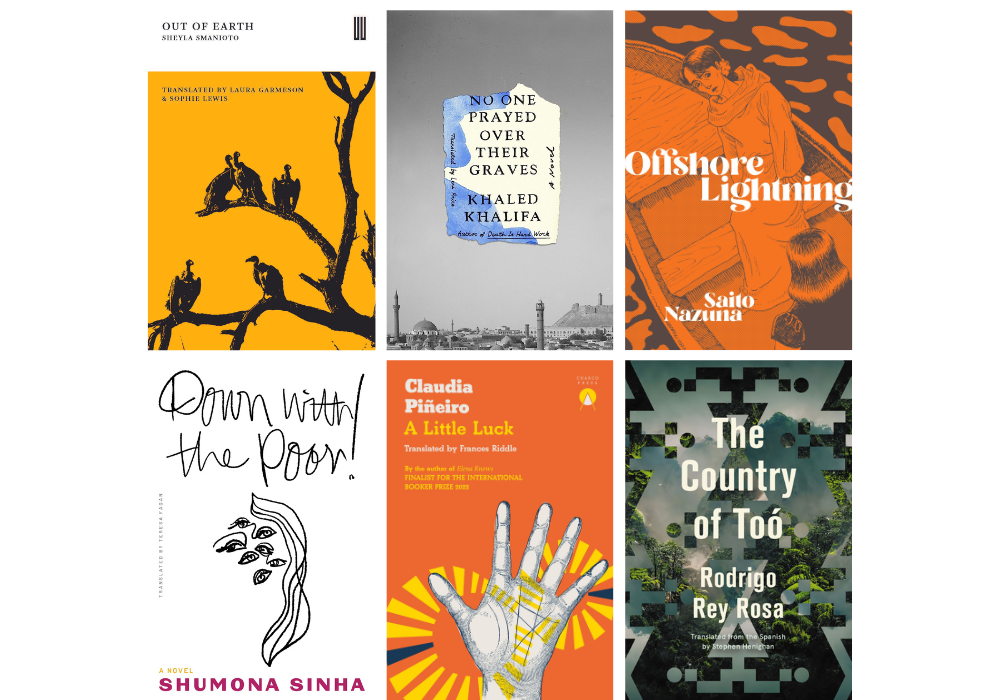Papá gave me this notebook. It’s so you can draw life, he told me from bed, and write, when you learn how to write, he said, his eyes sunken deep, as I played on the rug.
He gave me the notebook because I told him about the bird that crossed the street at the crosswalk and about the red spider with little antennas. Spiders don’t have antennas, he said, smiling, and I said this one did, it was probably a different insect, he said, and I replied that it was not, that it was a spider, that I’d asked her and she’d moved her antennas that looked like black pins coming out of her head, and that had confirmed for me that she was a spider. Yesterday, with serious hands, he gave me the notebook and said that I have one of the pairs of eyes of the universe and the duty to register the things I see, what I hear on the street, like the blind man dressed as Santa Claus he saw years ago, rattling a plastic cup with a little bell tied to the handle and saying, spare a little change, a little change so I can see this Christmas.
Mamá is playing at the back of the house. She plays the way grown-ups play, on the computer. When I leave Papá in the living room or the bedroom and go on back to the room she calls her study, even though I have never seen her study there, she tells me for the hundredth time—like it was the first—about her farm and the things she’s grown, then she explains for the hundredth time that no, we can’t eat the raspberries, because I ask, for the hundredth time, if we can eat them. I ask her why she’s mad and then she tells me to go to Papá. When I don’t ask about the fruit or animals on her farm and go to him, her voice changes and before l leave the study she says something in the same tone as Diana when I don’t want to give her my ice cream.
Papá is sleeping and I draw what I saw today: a dirty woman, the kind Papá calls pufa pufa, walking down the street. She was smiling and the sun was on her face. I saw her right when she found a purple shoelace. She smiled, crouched down to pick it up, and tied it around her knee. Her legs were all wrapped up with shoelaces and ribbons as dirty as her. But full of colors. Her hair reminded me of Mamá’s, but dirtier. That’s the first drawing. I showed it to Papá when he woke up. He smiled and stroked my hair while I explained that I had seen her from the bus, close to the place that sells panes con pavo—turkey sandwiches. Papá’s words have a dry smell, as dry as the skin on his lips. Then I went off, happy, to show Mamá, who just grunted and turned to look at me for less than a second, less than half a second.
Mamá is playing and some cows on the screen are mooing. Mamá tells me not to waste her time, she has to produce seven hundred liters of milk. Mamá milks cows on the screen. I have to send the milk to the town nearby or I’ll lose money, she says, and tells me about the thousands she is on the verge of losing thanks to my drawing, and besides you made it for Papá, she says in the Diana tone. I think it’s best to go and when I am about to leave the study, she leaves her cows for a minute and says to me, stay here, don’t bother your father, and asks me to close the door. I don’t like to close the door, Mamá’s smoke bothers me, it stings my eyes and makes me smell bad. One time I told Mamá that I don’t like the smell, that the kids at school tease me, that they hold their noses and tell me I smell like the custodian and shout that I’m his daughter, then Mamá leaves her farm on the computer, gets up, and I see her over me, enormous. She shouts that I don’t love her, that now it turns out I don’t even like her smell, that all I want is to be with Papá and tells me to go, go and stay on the rug forever. I run out. That’s what Mamá says. But I wanted to show her my drawing, so really fast I draw some raspberries out in the hallway, and I go back to the study and tell her that the drawing is of her, full of colored ribbons, I tell her to look at the hair. Then Mamá smiles, for the first time in weeks, she smiles and strokes my head. I close the door and let the smoke stick to my clothes. The cows moo. It’s Saturday and I don’t have school.
© Denise Phé-Funchal. By arrangement with the author. Translation © 2014 by Lisa Dillman. All rights reserved.










